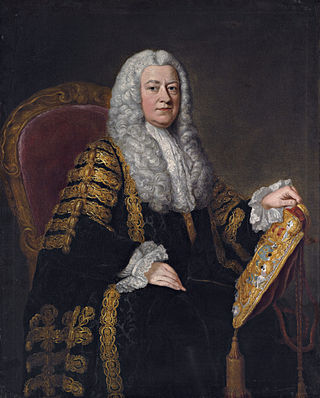Related Research Articles

The Court of Chancery was a court of equity in England and Wales that followed a set of loose rules to avoid a slow pace of change and possible harshness of the common law. The Chancery had jurisdiction over all matters of equity, including trusts, land law, the estates of lunatics and the guardianship of infants.

Philip Yorke, 1st Earl of Hardwicke, was an English lawyer and politician who served as Lord High Chancellor of Great Britain. He was a close confidant of the Duke of Newcastle, Prime Minister between 1754 and 1756 and 1757 until 1762.

Lord of the manor is a title that, in Anglo-Saxon England, referred to the landholder of a rural estate. The lord enjoyed manorial rights as well as seignory, the right to grant or draw benefit from the estate. The title continues in modern England and Wales as a legally recognised form of property that can be held independently of its historical rights. It may belong entirely to one person or be a moiety shared with other people.

Law reports or reporters are series of books that contain judicial opinions from a selection of case law decided by courts. When a particular judicial opinion is referenced, the law report series in which the opinion is printed will determine the case citation format.
Nominate reports, also known as nominative reports, named reports and private reports, is a legal term from common-law jurisdictions referring to the various published collections of reports of English cases in various courts from the Middle Ages to the 1860s, when law reporting was officially taken over by the Incorporated Council of Law Reporting, for example Edmund F. Moore's Reports of Cases Heard and Determined by the Judicial Committee and the Lords of His Majesty's most Honourable Privy Council on Appeal from the Supreme and Sudder Dewanny Courts in the East Indies published in London from 1837 to 1873, referred to as Moore's Indian Appeals and cited for example as: Moofti Mohummud Ubdoollah v. Baboo Mootechund 1 M.I.A. 383.

Sir Robert Atkyns (1620–1710) was an English Lord Chief Baron of the Exchequer, Member of parliament, and Speaker of the House of Lords.

Thomas-Chaloner Bisse-Challoner (1788–1872) DL, JP, was a British gentleman and militia colonel. He enlarged the former country house and landscape garden at Portnall Park, Virginia Water, and so laid the foundation for the Wentworth Estate and housing development in the surrounding area.

Gyles v Wilcox (1740) 26 ER 489 was a decision of the Court of Chancery of England that established the doctrine of fair abridgement, which would later evolve into the concept of fair use. The case was heard and the opinion written by Philip Yorke, 1st Earl of Hardwicke, and concerned Fletcher Gyles, a bookseller who had published a copy of Matthew Hale's Pleas of the Crown. Soon after the initial publication, the publishers Wilcox and Nutt hired a writer named Barrow to abridge the book, and repackaged it as Modern Crown Law. Gyles sued for a stay on the book's publishing, claiming his rights under the Statute of Anne had been infringed.

Speight v Gaunt [1883] UKHL 1 is an English trusts law case, concerning the extent of the duty of care owed by a fiduciary.
John Tracy Atkyns was an English barrister-at-law and compiler of the Atkyns' Reports.
Sir Edward Atkyns was an English lawyer and politician who sat in the House of Commons in 1660. He was the Chief Baron of the Exchequer from 1686 to 1689.
Thomas Barnardiston was an English barrister and legal reporter, famed for the inaccuracy of his law reports.
Reports of cases in the High Court of Chancery, with some few in other courts, from 1737 to 1783 is the title of a collection of nominate reports, by Charles Ambler, of cases decided by the Court of Chancery between approximately 1737 and 1784. For the purpose of citation their name may be abbreviated to "Amb". They are reprinted in volume 27 of the English Reports.
Reports of cases in the Court of King's Bench, in the 11 and 12 years of Geo. II. is the title of a collection of nominate reports, by George Andrews, of cases decided in the Court of King's Bench between approximately 1738 and 1739. For the purpose of citation their name may be abbreviated to "Andr". They are reprinted in volume 95 of the English Reports.
Reports of Cases in the High Court of Chancery, 13 and 14 Geo. II. from April 25, 1740, to May 9, 1741 is the title of a collection of nominate reports, by Thomas Barnardiston, of cases decided by the Court of Chancery, between approximately 1740 and 1741. For the purpose of citation, their name may be abbreviated to "Barn C". They are reprinted in volume 27 of the English Reports.
A Digest of the Laws of England, also known as Comyns' Digest, is a book by Sir John Comyns. The latest English edition was published in 1822. A 120-page, handwritten tabulation by John Neal in 1826 of all cases in the digest is included with the Jeremy Bentham papers at the University College London.

Belchier v Parsons (1754) 96 ER 908 is an English trusts law case, which stands as one of the earliest formulations of the prudent person rule.
Ann Paxton Gee v William Pritchard and William Anderson(1818) 36 ER 670 is a landmark judgment of the UK Chancery court. The case related to what matters the court could consider, court consistency and what constituted property.

The history of equity and trusts concerns the origin of the body of rules known as Equity, Uses, English trust law and their development into the modern body of trust law that spread with the Common law to the Commonwealth and the United States.

Cooper v Phibbs [1867] UKHL 1 is an English contract law case, concerning the doctrine of mistake.
References
- Atkyns, J T. Reports of Cases argued and determined in the High Court of Chancery, in the time of Lord Hardwicke, from 1737 to 1754. 3d ed. By F. W. Sanders. 3 vols. 8vo. London. 1794. New York. 1826.
- "The Reporters and Text Writers" (1875) 1 Southern Law Review 223 and 498
- ↑ Marvin, J.G. Legal Bibliography, or a thesaurus of American, English, Irish and Scotch law books:together with some continental treatises. T & J W Johnson. 1847. Page 76, from Google Books.
- ↑ Index Chart issued for the English Reports, 1930, Stevens & Sons Ltd. (London), W. Green & Son, Ltd. (Edinburgh). Page 5.
- ↑ Marvin, J.G. Legal Bibliography, or a thesaurus of American, English, Irish and Scotch law books:together with some continental treatises. T & J W Johnson. 1847. Pages 76 to 78.